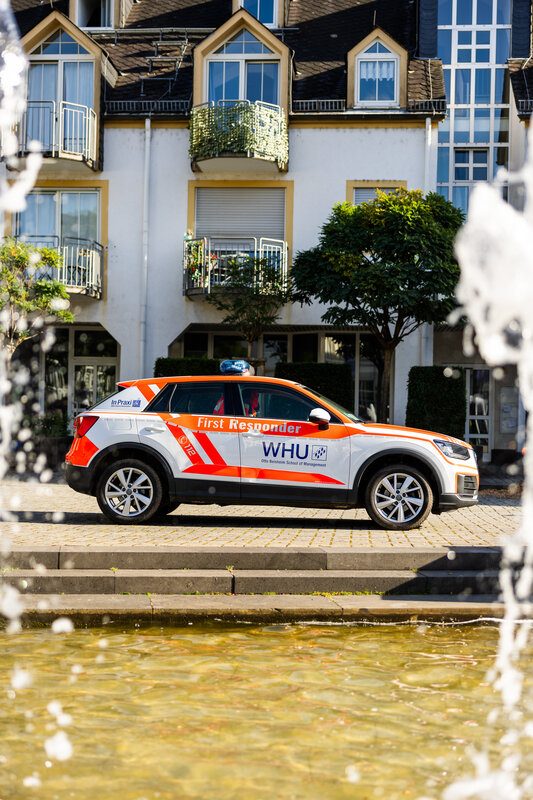Yannick Ziller, Chairman of WHU First Responder, on the group's volunteer work and what it takes to get the job done
In the Vallendar area, the student-led organization WHU First Responder has been offering emergency services—and in some cases, even saving people’s lives—for over 20 years. WHU student Yannick Ziller (BSc 2027), head of the operation, sat down with us in an interview to discuss the driving force behind his volunteer work, what people should remember in the heat, and why preventive measures during the summer are so important.
WHU First Responder has been active on the scene at emergency sites in and around Vallendar, regardless of whether they involve students, for 22 years. Yannick, you are the current chairman of the student group. What motivates you to be a first responder?
I have always had an interest in the medical field. I have also always been an athlete, and playing so many sports comes with injuries and contact with medical professionals. Before coming to WHU, I had already completed a paramedic program. And working with the public, having an opportunity to help them in serious situations, always fascinated me. It’s a great feeling knowing you could save somebody’s life. Apart from that, our group’s sense of teamwork is incredible.
Heart attacks, unconsciousness, even just a simple fall. When you are called into action, you never know what you are going to find. How do you prepare yourself for serious situations?
All new members of the group complete a first-aid course offered by the German Red Cross (DRK). Anyone going out and answering a call needs to know the necessary procedures and how to prepare themselves mentally. Our goal is to react, even to the toughest of situations, in a professional manner.
They have announced the return of summer weather in Germany for the end of the week, with temperatures surpassing 30° C (85° F). What types of calls do you tend to see come in during the summer?
In the summertime, we see an increase in circulation issues, particularly among older people who have not hydrated enough. Symptoms such as headaches, nausea, or vertigo can be indicators of heatstroke. While it is generally a great thing that people tend to be more active in the summer, going on bike rides and doing other outdoor activities, we have to remember all of that can lead to more accidents. That being said, the cases we take in the summer are generally not all that different from those we have in the winter.
What does WHU First Responder recommend people do in the heat to mitigate a potential emergency?
Keep hydrated. That’s the long and short of it. Regardless of age, drink water, and not just when you’re thirsty. Sports and similar physically demanding activities are best to do earlier in the morning or later in the evening. Lightweight, breathable clothes and an appropriate amount of protection from the sun, that is, sunscreen and visors, are essential as well. Anyone feeling generally unwell should not hesitate to seek medical help.
Would you say that WHU First Responder receives more calls because of the heat?
I wouldn’t say that. The number of cases we have fluctuates wildly. One week, we will have zero cases but then have one day stacked with multiple. Last semester, for example, we had around 54 cases, a rather high number when you think that we only had three members active on the ground at that time. But regardless of the number of cases we see in the summer, everyone should remember that the heat can be dangerous and that it harbors some serious health risks.
Click here to learn more about WHU First Responder and its work.

